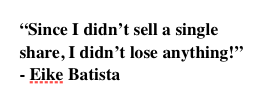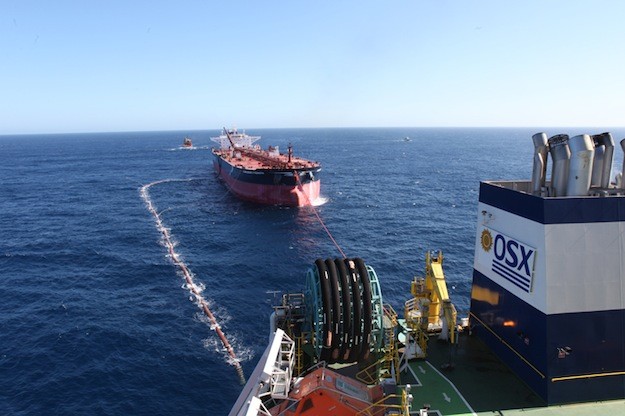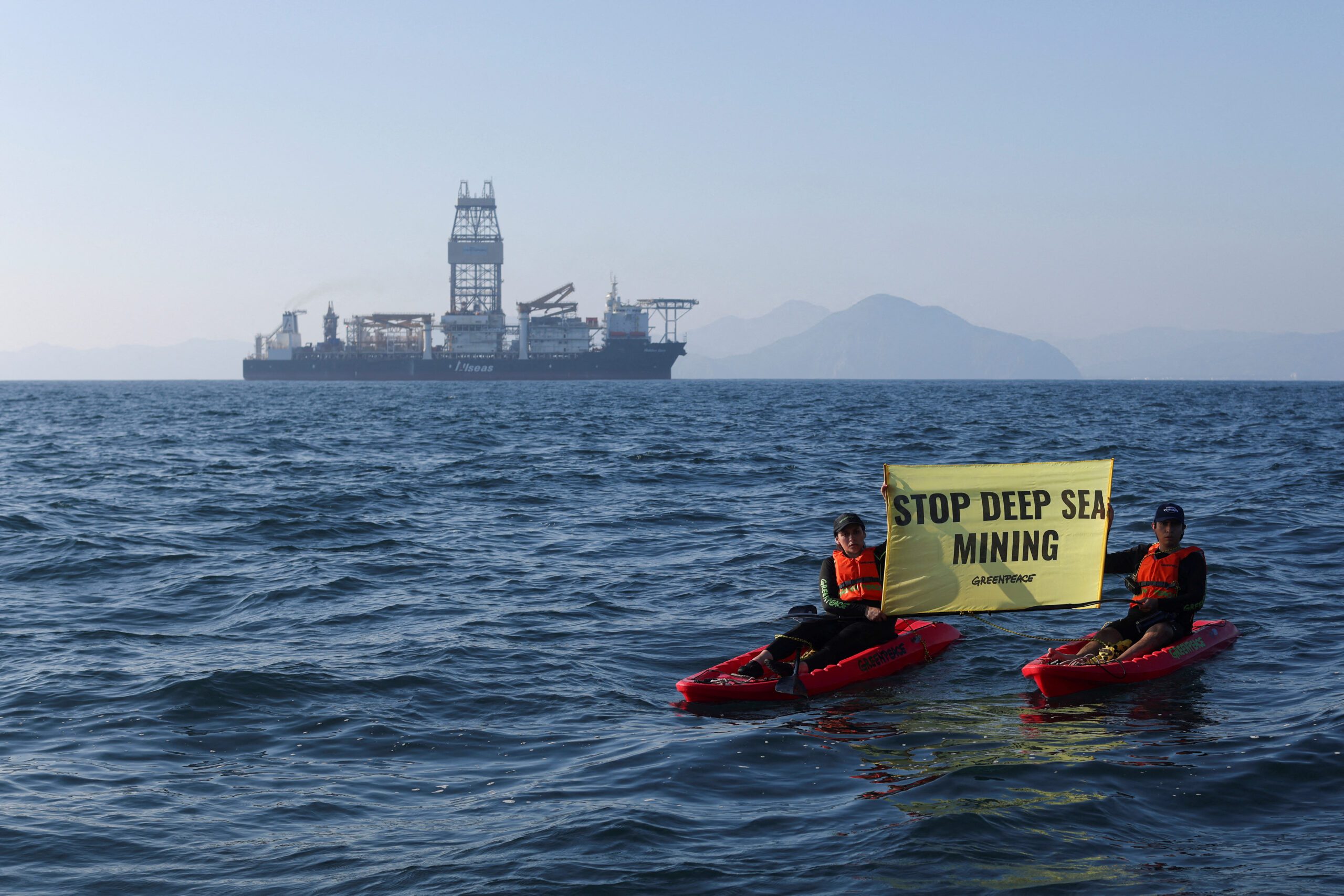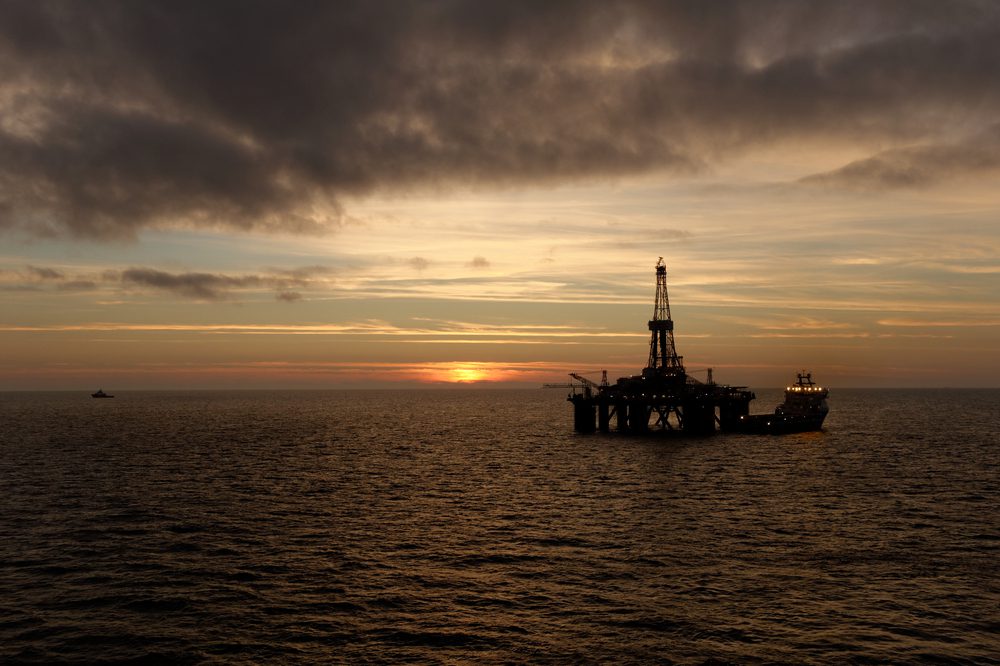On March 28, 2012, OGX offloaded its first batch of Waimea crude oil from the OSX’s FPSO OSX-1 in the Campos Basin, totalling approximately 600 thousand barrels for Shell. Image: OGX
(Bloomberg) — When Eike Batista pitched investors on $6 billion in stock offerings over the past six years, he was selling more than his personal empire of interlinking commodity startups. He was selling Brazil.
That’s why, when Batista’s oil venture reduced production targets less than six months after pumping its first barrel of crude — deepening a sell-off that erased $15 billion from his net worth and $21 billion in market value in three months –also in doubt was his vision of Brazil as a new powerhouse on the world stage.
Batista, 55, became Brazil’s richest man by riding a wave of optimism about his country’s prospects that culminated in a 7.5 percent surge in gross domestic product in 2010. Under President Dilma Rousseff, economic growth is now stalling for a second year, and is forecast at 2 percent in 2012, the slowest among the BRIC nations of Brazil, Russia, India and China.
“What’s going on with Eike right now is unfortunately a reflection of what’s going on in the country as a whole,” said Simon Nocera, a former economist at the International Monetary Fund, who now runs San Francisco-based Lumen Advisors LLC. “It’s more of those boom and bust scenarios of the past.”
As global commodity prices slipped into a bear market last month, economists surveyed by Brazil’s central bank have cut their forecast for the country’s economic growth this year for nine weeks running. Retail sales fell in May by the most since 2008 amid rising consumer defaults. Brazil’s benchmark stock index is down 23 percent since the end of 2010, with Batista’s oil producer, OGX Petroleo & Gas Participacoes SA, among the biggest losers.
Resolve Unshaken
 Batista’s resolve remains unshaken. After share prices for his six publicly traded companies recovered some of their losses this month, his net worth has rebounded to $20.7 billion from a low of $19.6 billion on June 28, according to the Bloomberg Billionaires Index. He is the 21st richest person in the world.
Batista’s resolve remains unshaken. After share prices for his six publicly traded companies recovered some of their losses this month, his net worth has rebounded to $20.7 billion from a low of $19.6 billion on June 28, according to the Bloomberg Billionaires Index. He is the 21st richest person in the world.
“My fortune is in my assets,” Batista posted to his almost 1 million Twitter followers on July 1. “Since I didn’t sell a single share, I didn’t lose anything!”
In an e-mailed response to questions, Batista’s holding company, EBX Group Co., said its companies have enough cash to plow ahead with a $15.7 billion investment plan. While its oldest public venture, MMX Mineracao & Metalicos SA, didn’t turn a profit in 2011, it produced 7.5 million tons of iron ore. OGX, even after missing its targets, went from inception to production in less than five years — which Batista has called a “world record.”
OGX’s shares dropped 2.9 percent to 5.74 reais at 12:17 p.m. in Sao Paulo, as the Bovespa index declined 1.2 percent. MMX fell 4.1 percent to 5.64 reais.
Punishing Market
“You are going to have these kind of setbacks,” said Laurence Balter, who oversees $100 million for Fox Island, Washington-based Oracle Investment Research and increased his holdings in OGX after the plunge. “Eike has put his foot in his mouth on more than one occasion, and the market is punishing him for that.”
During former President Luiz Inacio Lula da Silva’s time in office, from 2003 through 2010, tens of millions of people were lifted from poverty as economic growth quickened, borrowing costs fell and public finances improved. The Bovespa stock index rose six-fold as China’s growing appetite for commodities increased earnings for Brazil’s biggest companies: iron-ore miner Vale SA and oil producer Petroleo Brasileiro SA.
Batista promised to compete against the two giants with his own startup ventures, and filled top management spots with their former executives — including his own father, Eliezer, who has served both as mining minister and Vale chief. Batista, who said in April 2010 that Lula “walks on water,” has relied on subsidized loans from Brazil’s national development bank, known as the BNDES, in addition to cash from private investors.
Biggest Successes
His two biggest successes came in the first half of 2008, as prices for oil and iron ore approached record highs: the 6.7 billion-real ($3.3 billion) initial public offering of OGX, and the $5.5 billion sale of the Minas-Rio mining business to Anglo American Plc. OGX also benefited from optimism surrounding Brazil’s recent announcement of the largest oil discovery in the Americas since 1976 — the Tupi field, since renamed Lula.
The euphoria surrounding Brazil’s prospects began to waver at the start of 2010, with a credit-fueled rebound from the 2009 recession raising the specter of an overheating economy — just as Batista was preparing to sell shares in OSX Brasil SA. The shipbuilding venture ultimately raised just a quarter of what he’d initially sought, after investors balked at putting up cash for a company whose main asset was the guarantee of orders from OGX, which had still yet to produce a drop of oil.
Ballooning Costs
Both companies have repeatedly failed to meet Batista’s targets in bringing their operations online. Even after beginning to produce revenues, OSX is now trading at less than a third of the price offered in its initial sale, while OGX has lost half its value.
The Minas-Rio iron-ore project — now Anglo American’s largest — has also failed to meet expectations. Beset by legal challenges and ballooning costs, the project is slated to come online in 2013, after having initially been projected to start by 2010.
“It won’t be ready in 2026,” said Joao Carlos Cavalcanti, who partnered with Batista on an iron-ore business that was later subsumed into MMX. “Eike told them it had 750 million tons of ore, but it doesn’t have 150 million. They fell for Eike’s blue eyes. He’s very beguiling.”
The geologist, now developing rare-earth deposits in northeast Brazil, is suing Batista for allegedly failing to make agreed investments in their joint venture. “The guy is a bubble,” Cavalcanti said.
EBX declined to comment on Cavalcanti’s allegations. MMX said its chances of losing the lawsuit are “probable,” according to a regulatory filing detailing legal liabilities.
One Dividend
In six years, Batista’s six publicly traded companies have made just one dividend payment — and that because of a one-time financial gain. Still, the dearth of cash hasn’t stopped Batista from diversifying into a slew of new closely held ventures, from technology to Rio de Janeiro real estate to sports and music events-management.
In an interview with Bloomberg News in March, Batista said he exemplified a new “Brazilian dream” of entrepreneurial success. He repeated his goal of overtaking Carlos Slim as the world’s richest man by 2015, a feat that would require him to double his wealth at the time.
Batista’s net worth peaked at $34.5 billion on March 27, after he sold a 5.6 percent stake in EBX, the umbrella for most of his assets, to Abu Dhabi’s Mubadala Development Co. for $2 billion.
Great Salesman
While boosting his personal fortune, the deal did little to comfort investors in his publicly traded companies. Shares continued to sink even after Batista sold another $300 million stake in EBX to General Electric Co. in May. The sell-off peaked when OGX announced last month it was cutting output targets for its first two wells by as much as 75 percent, intensifying doubts as to whether he’d oversold his companies’ prospects.
“What’s actually true, and what’s just the fact that he’s a great salesman?” asked Henrique de La Rocque, who manages 300 million reais at Brasif Gestao de Recursos in Rio de Janeiro. He said he’s holding on to his OGX shares at least until the “panic” subsides.
Track Record
In its e-mailed response to questions, EBX pointed to Batista’s 30-year track record in developing eight gold mines and one silver mine across Brazil, Canada and Chile. Batista pursued — and abandoned — several companies during that time. In 1999, Batista sold a water business to a unit of Enron Corp. for $55 million, telling Bloomberg News after the deal: “Gold is a Jurassic industry. Water is the industry of the 21st century.”
Batista’s success lies in finding the right projects and picking good teams, according to Carl Hansen, who spent a decade working with Batista at TVX Gold Inc. in Toronto in the 1990s.
“Without question he has a talent for identifying undervalued assets, and then increasing the value of those assets by doing the work and then finding investors to move them forward,” said Hansen, who worked at TVX first as a geologist and later as its director of investor relations.
As TVX’s chairman, chief executive and largest shareholder, Batista led the company’s market value to peak at more than $1.7 billion in 1996 as he invested in projects around the globe. A series of legal challenges, combined with a five-year slump in gold prices, drove the company’s value down to less than $150 million by the end of 2000.
‘Marketing Story’
Today, with the slowdown in China’s economy dragging down raw-material prices, Batista has plowed 2.6 billion reais into LLX Logistica SA’s Acu port project in Rio de Janeiro state. In March 2010 he said the complex will be a “highway to China” once completed.
A popular adage holds that Brazil is the country of the future, and always will be. For the past six years, Batista has sought to sell the idea that Brazil’s future had finally arrived, according to Nocera, the former IMF economist.
“It’s been a wonderful marketing story,” Nocera said. “When you make a lot of promises, sooner or later you need to deliver.”
By Alex Cuadros, Copyright 2012 Bloomberg.

 Join The Club
Join The Club




 Batista’s resolve remains unshaken. After share prices for his six publicly traded companies recovered some of their losses this month, his net worth has rebounded to $20.7 billion from a low of $19.6 billion on June 28, according to the Bloomberg Billionaires Index. He is the 21st richest person in the world.
Batista’s resolve remains unshaken. After share prices for his six publicly traded companies recovered some of their losses this month, his net worth has rebounded to $20.7 billion from a low of $19.6 billion on June 28, according to the Bloomberg Billionaires Index. He is the 21st richest person in the world.






